The Cambridge course provides the most thorough veterinary education available. Running over six years, it includes an intensive practical and clinical training, as well as the bonus of a full Cambridge BA degree, usually (but not always) a science degree – often invaluable in our graduates’ future careers.
(‘Affiliated’ students, who come to us with a degree, take a five-year version of the course, omitting the third, BA degree year.)
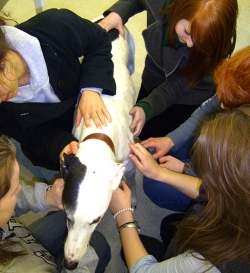 Year 1
Year 1
The first year is your introduction to the practical and scientific world of Veterinary Medicine – taking the three-year ‘Veterinary Sciences Tripos’.
The Principles of Animal Management course starts immediately and covers diverse areas of animal husbandry, management and the economics of animal-related industries.
From week one and throughout the year you will attend animal handling courses with all the major domestic species – a superb grounding for the twelve weeks of Pre-Clinical Extramural Studies which all UK vet students must complete in their first two years (three years at Cambridge if you don't already have a degree – so our students have more time to do this). You should also read about financial support for course-related vacation studies available from Cambridge colleges under the ‘Help with your finances’ menu tab.
You will also study an intensive course in Veterinary Anatomy, involving 120 hours of dissection in small groups (three to five students), and ‘Introduction to Clinical Examination’ sessions which give you the chance to learn the basics of orthopaedic examination, thoracic auscultation, echocardiography and abdominal palpation.
A course in Biochemistry, Molecular Biology and Genetics introduces you to the cellular basis of modern veterinary practice – in many ways these topics are more clinically important for vets than for the medical students with whom this course is co-taught. Ruminant medicine, for example, is based on a firm understanding of these species’ unusual metabolic pathways.
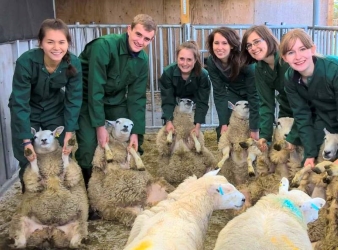 Physiology is the key to Medicine, so constitutes another important element of the first year. Experimentally-based, this course gives you an unparalleled understanding of how the body’s systems function and interact – once again taking advantage of the small practical groups we are able to accommodate at Cambridge.
Physiology is the key to Medicine, so constitutes another important element of the first year. Experimentally-based, this course gives you an unparalleled understanding of how the body’s systems function and interact – once again taking advantage of the small practical groups we are able to accommodate at Cambridge.
In the first, second and third years, all students benefit from college-based small group teaching sessions (‘supervisions’) which allow them to consolidate their learning and follow up on topics which particularly interest them. Cambridge is the only veterinary school which provides such a rewarding method of teaching.
Throughout the first year, and indeed throughout all years of the course, all students have twenty-four-hour access to our Clinical Skills Lab, to allow them to link the science they are studying to practical veterinary tasks.
“The small year size allows for small group teaching and a more personal and friendly time at the Vet School.” - Ellen
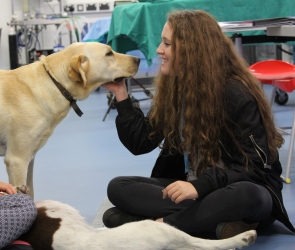 Year 2
Year 2
In the second year, you will complete the ‘Preparing for the Veterinary Profession’ course, which further develops your understadning of the professional, ethical, financial, managemental and social responsibilities of veterinary surgeons.
You also continue your Pre-Clinical Extramural Studies, and will be guided through this process by your specially-appointed Veterinary School Clinical Supervisor - your 'pre-professional' mentor.
You will continue to be immersed in the cutting-edge scientific environment of Cambridge. For example, Cambridge neuroscience is world renowned, and the course in Neurobiology and Animal Behaviour will give you an in-depth understanding of the workings of the animal nervous system, a preparation for veterinary anaesthesia, and an introduction to neurological examination.
The reproductive system is so important to veterinarians that is has its own course. The anatomical, evolutionary, ecological and functional aspects of animal breeding, from gametogenesis to neonatology, are covered in detail.
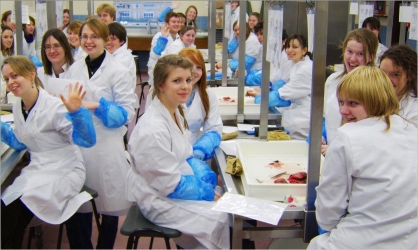 Comparative Vertebrate Biology, as you would expect, teaches you about the biology of fish, amphibians, reptiles, birds, and mammals other than the major domestic species. This course includes handling sessions as well as talks by experts in wildlife and exotic animal husbandry.
Comparative Vertebrate Biology, as you would expect, teaches you about the biology of fish, amphibians, reptiles, birds, and mammals other than the major domestic species. This course includes handling sessions as well as talks by experts in wildlife and exotic animal husbandry.
A superb course in Pathology introduces our students to disease processes in animals’ cells, tissues and organs, the agents which cause those diseases, and the defences the body deploys to fight disease. In addition, an invaluable course in Pharmacology explains how drugs enter the body, are distributed around it, and achieve their intended (and unintended) effects – a solid basis for future medical interventions.
As well as continued access to our Clinical Skills Lab, you will also have further opportunities to improve your practical animal handling skills in all major veterinary species.
“I loved the breadth and depth of pure science. Supervisions were a wonderful opportunity to learn, and laboratory practices (particularly anatomy and pathology) were really useful and enjoyable.” - Katherine
Year 3 – the Cambridge BA science degree
The third year is one of the most distinctive features of the entire course – a time when our students pursue a subject of their choice for a whole year to achieve a full Cambridge BA degree, usually in a Natural Science subject (alongside our Natural Science and Medicine students).
Please note that affiliated students - those who come to us already having obtained a qualifying degree - usually omit the third year.
While opportunities in animal handling and clinical skills continue, the third year gives Cambridge veterinary students an exciting opportunity to work with scientists at the cutting edge of their field, and they often also carry out an in-depth research project of their own.
Most vet students study a biological subject – Anthropology (including Primatology), Biochemistry, Pathology, Developmental Biology, Physiology, Neuroscience, Pharmacology, Psychology and Animal Behaviour, or Zoology (with options including Palaeontology, Ecology, Conservation Biology and Evolutionary Biology). However, some other subjects offer third year courses which vets can access - in the past, veterinary students have gained their third year BA degrees in (Bio-)Engineering, Geography, History and Philosophy of Science, History of Art, and Management Studies.
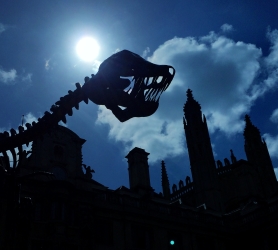 You do not choose your third-year course until the end of the second year, so there is ample time to decide which direction you wish to take.
You do not choose your third-year course until the end of the second year, so there is ample time to decide which direction you wish to take.
Having a BA degree from the world's premier science university can often prove invaluable in our graduates’ later careers. The Cambridge BA is an internationally recognised mark of scientific excellence, and explains why many of our vet graduates secure positions in research, teaching and clinical practice at leading practices and institutions around the globe.
The third year is the reason why the Cambridge course is one year longer than at the other UK veterinary schools, and we believe that the extra year is a major reason to apply to the course here, and more than justifies the extra time required to complete it.
Indeed, the relative inexpensiveness of studying at Cambridge (see the ‘Help with your finances’ menu tab) often means that studying here for six years costs a similar amount, or less than, five years elsewhere.
What options are available in the third year?There are three directions our vets (and medics and natural scientists) can take in their third year and they are listed here. The first two of these are the most common, but each year some of our students take the last route. If you want to find out more about any course, internet search ‘cambridge university part ii XXX’ where ‘XXX’ is the name of the course listed below. Please bear in mind that these details are correct at the time of writing, but the rapidly changing nature of science means that course options may change somewhat over the coming years. 1. Single-subject Natural Sciences This choice allows you become ‘embedded’ in one or more Cambridge biological science departments for a whole year. There is usually a choice of modules – sometimes lots of them – within each course, and you would usually also undertake one or more practical projects as part of your course. Biochemistry – the fundamental aim of this course is to inform, to stimulate, to place new findings into the context of molecular and cell biology, and to emphasise how new information is obtained and what limitations there are on this process Genetics – five compulsory modules: cell cycle and cancer, plant and microbial genetics, developmental genetics, genomics and systems biology, evolutionary genetics History and Philosophy of Science – more essay/dissertation-based than the other options – options include: early history of science; sciences and empires; modern life sciences; philosophy and scientific practice; epistemology and metaphysics of science; ethics and politics of science Pathology – choose two from these five options, the last of which is particularly veterinary-oriented: cancer and genetic diseases, immunology, microbiology and parasitology, virology, dynamics of infectious diseases Pharmacology – this provide a wide-ranging, balanced and critical treatment of pharmacology as it relates to understanding mechanisms of drug action, and equips you with a range of skills for a wide variety of future veterinary-related careers Physiology, Development & Neuroscience – you choose four courses from a range of more than twenty, focusing on themes in development and reproduction, integrative physiology and neuroscience Plant Sciences – also shares what is effectively a distinct Ecology course with Zoology Psychology – bear in mind that much ‘experimental psychology’ is actually ‘animal behaviour’, so vets are well prepared for this course’s main themes: cognitive and experimental psychology; behavioural and cognitive neuroscience; social and developmental psychology Psychology, Neuroscience and Behaviour – shared between three departments and includes a wide range of evolutionary, cellular, behavioural and cognitive perspectives on the study of the brain Zoology – students choose four modules from fifteen-or-so, including conservation, vertebrate evolution, evolution and behaviour, mammalian faunal history, ecology, as well as several more cellular and molecular options
This allows a different approach in which ‘BBS’, students select a ‘major’ subject from the above list which provides approximately 80% of your teaching, and a ‘minor’ subject chosen from a wide range of options which provides the other 20%. BBS students also undertake a library-based dissertation – and we provide advice about whether a practical project or dissertation best suits the aspirations of each student. 3. Other subjects Each year, several of our vet students take a route into another Cambridge degree course. To gain an honours degree, our students must take a third year course in whatever subject they choose. While this can be a daunting prospect in some subjects (e.g. Modern Languages or Maths), there are some third year courses which are designed to encourage students from other subjects to transfer into them. Archaeology and Anthropology – includes biological anthropology Bioengineering – an exciting interdisciplinary option for students with strong school maths skills Geography – an enormous range of options, often touching on ecology and the environment Human, Social and Political Sciences – another large and diverse course Management Studies Tripos – invaluable for vets who see management as a major part of their future career |
“I really enjoyed the intellectual challenge and cutting edge information, particularly during my third year, and the diversity of the material that we were learning.” - Emily
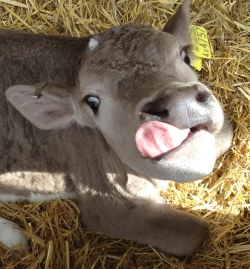 Year 4
Year 4
Because the course includes vertically-integrated themes spanning all years of the course – animal management, reproduction, breeding and infertility, professionalism, communication and consultation skills – the transition into the fourth year, based more at the Vet School than in the centre of Cambridge, is a smooth one.
In this year, students spend much of their time applying their scientific knowledge and practical skills to clinical scenarios, and clinical practice – starting the ‘Vet MB’ degree.
Lectures are complemented by a series of practical classes, called ‘rotations’, in areas such as consultation skills, farm animal clinical studies and visits to the RSPCA Clinic in Cambridge. Fourth-year students also lamb the flock at the University Farm in January and February.
The topics covered reflect the huge range of skills a vet must acquire – Anaesthesia, Infectious Diseases, Clinical Pathology, Clinical Pharmacology, Oncology, Diagnostic Imaging, Principles of Surgery, Evidence-Based Medicine, Poultry Husbandry and Disease, Animal Breeding, Cattle Medicine, Integrated Animal Management, Small Ruminant Husbandry and Medicine, Veterinary Public Health, and Exotic, Wildlife & Conservation Medicine.
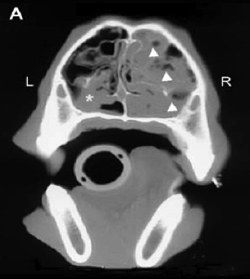 In addition there is also in-depth training in body-system-focused medicine and surgery – The Alimentary System, Dentistry, Ophthalmology, Orthopaedic Pathology, and The Respiratory System.
In addition there is also in-depth training in body-system-focused medicine and surgery – The Alimentary System, Dentistry, Ophthalmology, Orthopaedic Pathology, and The Respiratory System.
The fourth year also marks the start of an exciting new phase of ‘Clinical Extramural Studies’ – twenty-six weeks participating in external veterinary activities which all UK vet students must complete. One again, individualised support and advice is available via your Vet School Clinical Supervisor.
Cambridge Vet School is unique in paying its students a small amount to support their Clinical EMS – also, read about the financial support available from the Cambridge colleges under the ‘Help with your finances’ menu tab.
“Lambing was a fun experience! The staff were great teachers - enthusiastic and always encouraging us to get hands-on experience.” - Sam
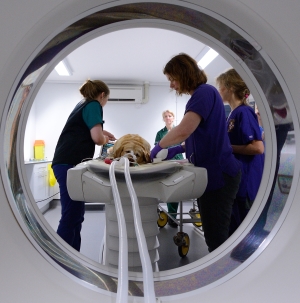 Year 5
Year 5
During the fifth year, the practical and clinical focus of the course increases even more – with further development of veterinary skills relating to different disciplines, organ systems, and species.
As in the fourth year, two mornings per week are set aside for ‘rotations’, in areas such as consultation skills, bovine footcare and obstetrics, neurology, equine cardiology and further visits to the Vet School-affiliated RSPCA Clinic in the city – continually benefiting from Cambridge’s small teaching group sizes.
Most courses have a strong practical component, and our students further hone their practical skills in the Clinical Skills Centre. Systems-based courses include Cardiology, Urology, Neurology, Endocrinology, Dermatology, Emergency and Critical Care, Reproductive Pathology, and Infertility and Obstetrics.
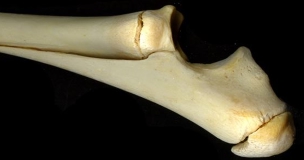 There is also a further move towards species-focused practice, with in-depth training in Pig Medicine, Small Animal Medicine, Small Animal Orthopaedics, Small Animal Soft Tissue Surgery, Cattle Medicine, Equine Orthopaedics, Equine Surgery and Equine Medicine – all the time drawing on the wealth of expertise and the extensive facilities available at the Vet School.
There is also a further move towards species-focused practice, with in-depth training in Pig Medicine, Small Animal Medicine, Small Animal Orthopaedics, Small Animal Soft Tissue Surgery, Cattle Medicine, Equine Orthopaedics, Equine Surgery and Equine Medicine – all the time drawing on the wealth of expertise and the extensive facilities available at the Vet School.
Practising vets do so much more than direct clinical work, however, so we also run excellent courses in client communications and practice management.
All our students then embark upon a two-week series of clinic induction activities, to prepare them for their sixth-year rotations.
“I enjoyed going to the RSPCA clinic throughout the clinical course as it was a great opportunity to touch base with a clinical veterinary setting, which complimented the teaching we received during lectures and rotations.” - Lisa
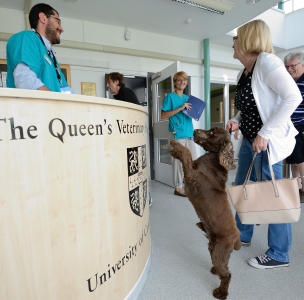 Year 6 – a whole year in clinics
Year 6 – a whole year in clinics
The grand culmination of our course, during the lecture-free sixth year our students enjoy forty weeks of ‘rotations’ in the different disciplines of Veterinary Medicine. This is the time when our small class sizes really come into their own - our clinical groups are tiny so each student manages more cases, gains more experience, and becomes more confident by the time they qualify.
These rotations provide unparalleled opportunities for our students to build on their academic knowledge, develop skills and techniques used in veterinary practice, gain invaluable experience in client and peer communication, and acquire clinical experience in diagnosis, management and care of patients.
Rotations include Small Animal Surgery (Soft Tissue and Orthopaedic Surgery), Small Animal Medicine (including Oncology, Neurology and Clinical Pathology), Equine Studies, Farm Animal Practice, Anaesthesia, Imaging, and Out-of-Hours Care.
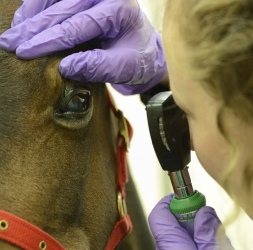 Every day you will welcome clients, take histories, examine patients, conduct investigations and formulate and enact treatment plans.
Every day you will welcome clients, take histories, examine patients, conduct investigations and formulate and enact treatment plans.
So clinical cases are used as the main basis of teaching, supplemented by ward rounds, seminars and clinic-based practical classes – and students also prepare written and oral presentations and case reports.
Sixth year students also complete an ‘elective’ project on a subject of their choice – undertaking a total of eight weeks’ work, four of which will be undertaken after their written and ‘live’ Vet MB Part III exams in April/May.
“It's so good to be able to spend all six years near to a cool city - and not in the middle of nowhere.” - Amelia
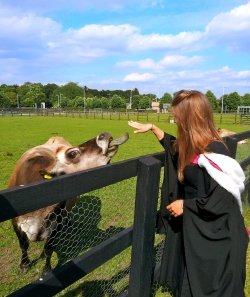 And Finally…
And Finally…
The veterinary programme at Cambridge carries conditional accreditation from the Royal College of Veterinary Surgeons (RCVS) in the UK and full accreditation from the European Association of Establishments for Veterinary Education (ESEVT of the European Association of Establishments for Veterinary Education) in the EU. Additionally, RCVS accreditation means that our graduates are licensed to work in Australia, New Zealand, South Africa and Ireland. Reciprocal arrangements between the RCVS and the Australasian Veterinary Boards Council (AVBC), the South African Veterinary Council (SAVC), and the Veterinary Council of Ireland (VCI), allow our graduates to practice in Australia, New Zealand, South Africa and Ireland without requiring any additional qualifications, subject to any visa requirements.
We are working constructively with the RCVS to regain Full Accreditation and look forward to welcoming them back to the Department in September 2025.
For full information about our accreditation status, please see our Accreditation page on our website.
|

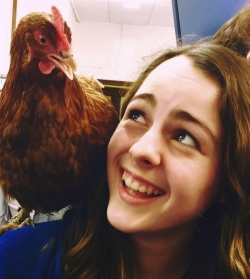 2. Biological and Biomedical Sciences
2. Biological and Biomedical Sciences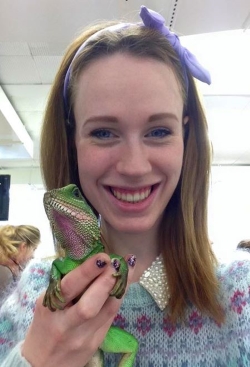 I want to specialise in zoo, wild or exotic animals, how do I do that?
I want to specialise in zoo, wild or exotic animals, how do I do that?